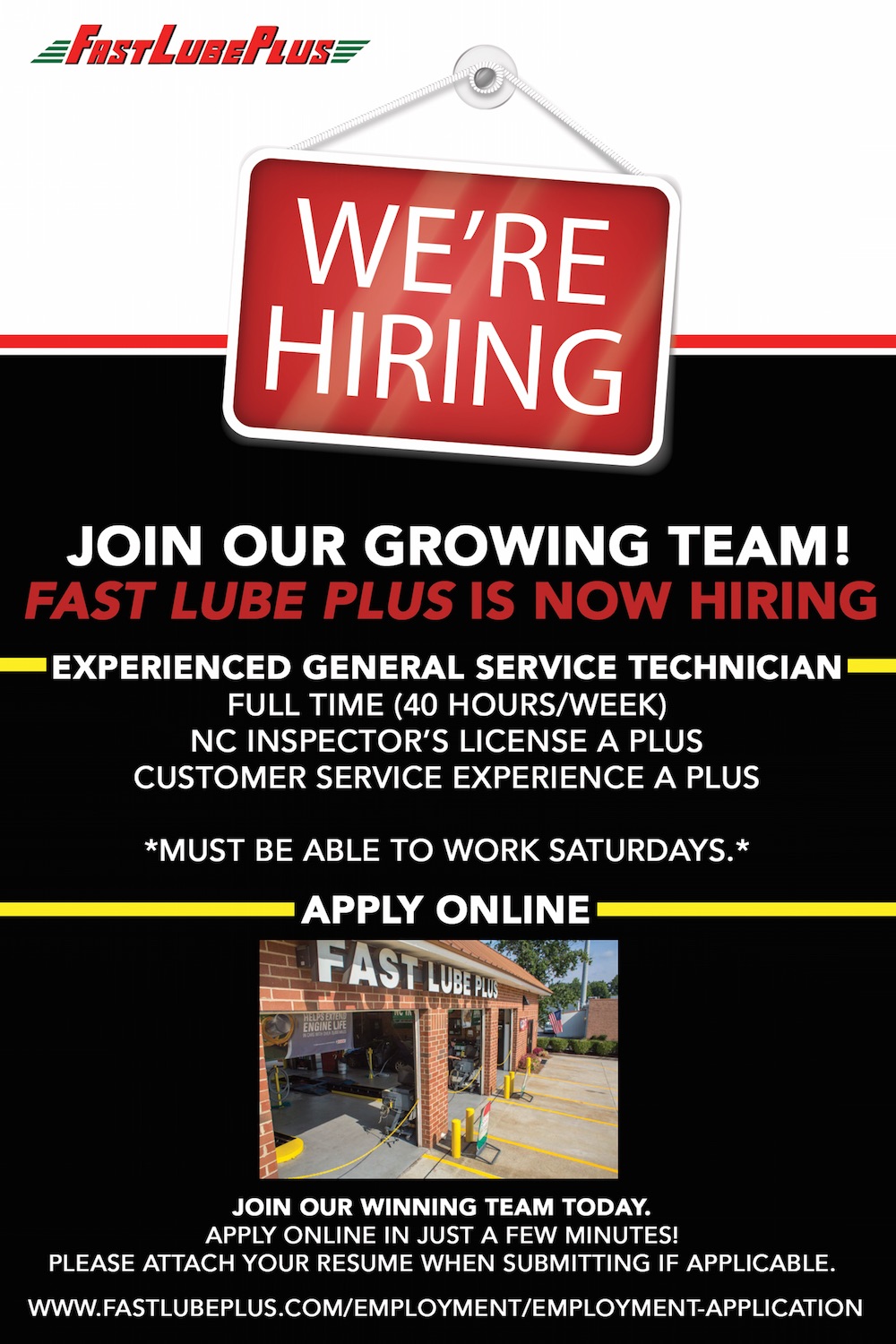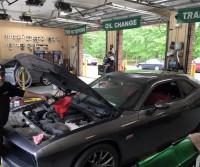
Regardless of its brand or age, every car needs regular tune-ups. Their behind-the-scenes nature means some drivers don’t see their value, but investing in preventative measures and routine checkups can save you future headaches! Here’s what goes into an average tune-up.
General Tune-up Procedures
Tune-ups can vary depending on the car and who is performing the tune-up. Generally, a tune-up consists of checking the engine for parts that need cleaning, fixing, or replacing. Common areas under inspection include filters, spark plugs, belts and hoses, car fluids, rotors, and distributor caps. Many of these only require a visual inspection or a simple test.
While some of these checks can be done at home, having professionals give your car a comprehensive tune-up guarantees that the engine is fully examined.
At Fast Lube Plus, tune-ups can also include analyzing exhaust emissions, adjusting ignition timing and idle speed control, and a thorough maintenance inspection.
Filters and Spark Plugs
Though tune-ups come in a variety of flavors, they almost always include your filters and spark plugs.
Fuel filters, oil filters, PCV valves (which help ventilate the engine), and air filters all help keep your engine clean. The filters catch contamination. Over time, clogs can develop as unclean fluids, air, dust, and other impurities get caught in the filters. If unchecked, dirty filters can lead to higher oil pressure, fuel pump failure, and many other expensive and annoying problems.
Spark plugs are the tiny electrodes that handle the “combustion” part of an internal combustion engine. They are subject to wear over time, as the metal is constantly under high pressure and temperatures. Rough idling and hard starts are often due to worn spark plugs. Their accompanying wires, rotors, and distributor caps can also wear out, and a good tune-up includes their inspection.
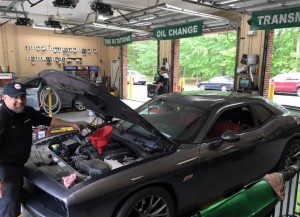 When to Get a Tune-up
When to Get a Tune-up
Though tune-ups are important, most cars don’t require them as often as they require other maintenance jobs, like oil changes. If you have a car from the 1970s or earlier, you probably should get a tune-up every 10,000 miles. Most newer cars should be checked every 30,000 – 50,000 miles or so, despite some manufacturers recommending a 100,000 mile interval.
Routine tune-ups are crucial to maintaining your engine’s performance and longevity. Next time you visit Fast Lube Plus, ask one of our experienced technicians about our tune-up services.
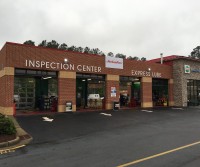
Fast Lube Plus is proud to have served Wake and Johnston counties for 15+ years. As the area has grown, so have we. And our next step has taken us further south into Wake County, into the town of Fuquay-Varina. Our newest store there is now open for business!
A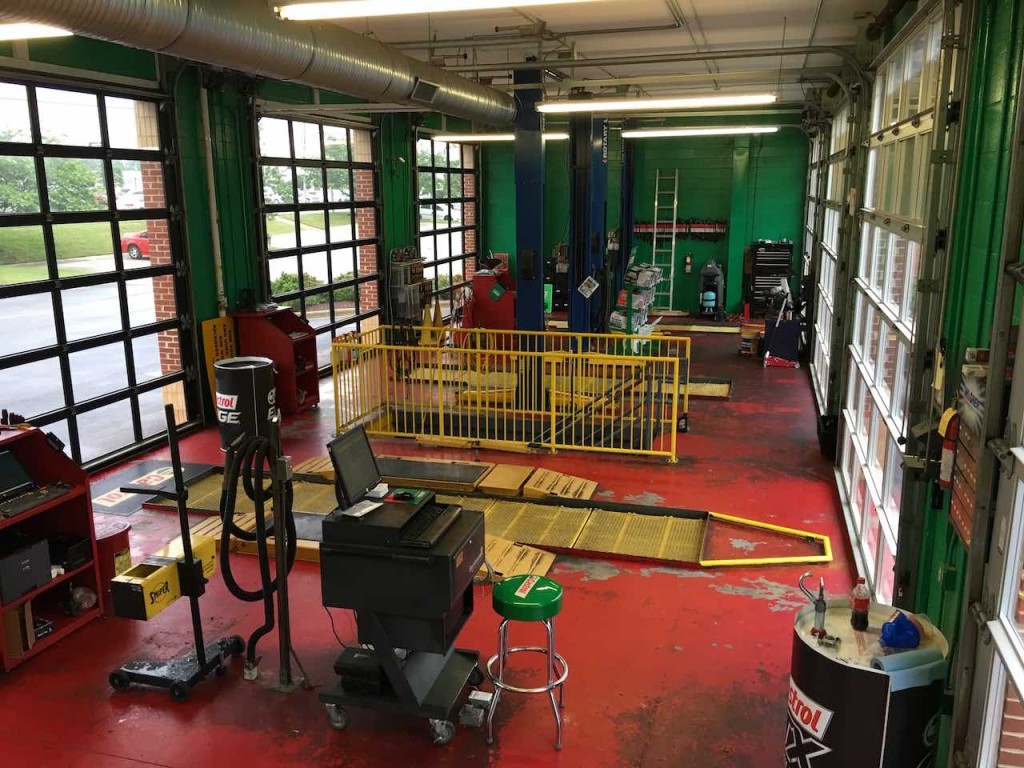 bout the Location
bout the Location
Our Fuquay-Varina store joins our existing locations in Apex, Cary, Morrisville, Holly Springs, and Garner. The shop sits in the heart of town at 1110 North Main Street, across from Walmart. Its proximity to both historic neighborhoods and new developments mean that we can serve as many residents of the city as possible. Main Street’s connection to US 401 also means that commuters can easily stop by on their way home from downtown or the RTP.
About Us
Fast Lube Plus is a regionally-based, family-owned comprehensive automotive maintenance provider. Operated by a father and son team, our owners Tom and Joe work alongside technicians in each of our locations. Our regular customers know us by name, and soon you will too.
Fast Lube Plus’ services run the gamut from routine oil changes and maintenance to diagnostics, belt repairs, tune-ups, and brakes. We are also a fully certified North Carolina Emissions Inspection station. We treat even routine maintenance with the same care and respect of the most complex job.
About Fuquay-Varina
Fuquay-Varina and Southern Wake County are in a unique position. These historically rural communities have bared the brunt of Raleigh’s explosive growth, with Fuquay-Varina doubling in population just since 2000. Much of this is due to the area’s tech industry, particularly in the Research Triangle Park.
With our experience in Raleigh’s other booming suburbs, we know the unique needs of a community on the rise. We understand how to respect old residents while adapting to the needs of transplants. And while we find our daily operations serve a valuable purpose – keeping people on the move – we also respect our place in our communities. Fast Lube Plus gives back through work with the Holly Springs Food Bank, the US Veteran Corps of Cary, and other local charities.
With this new expansion in Fuquay-Varina, we hope to keep a new community on the move!
One advantage of a used car is that you can learn from other owners about reliability. Even some of most popular used cars out there have small issues you should know about. Today we’re looking at four of the most popular used cars in America, and issues you should watch out for. If you need repairs or preventative maintenance, contact Fast Lube Plus today so we can help you!
Ford Escape
The Ford Escape (and its platform-mate, the Mazda Tribute) are popular choices for their interior room and car-like driving experience. Their biggest issue is shuddering above 40mph, almost always caused by poor transmission maintenance. If you don’t have this problem yet and have never changed your transmission fluid, now is the time!
The platform has a smattering of other, smaller problems. A dirty idle air control valve can cause sputtering in 2001-2006 models, and in irregularly shaped coolant tank can cause the warning light to come on even when you aren’t low. Have a shop check your wheel bearings too, as they’re an important safety feature that Escapes are known to wear out.
Chevrolet Impala
A popular fleet vehicle, Chevrolet Impalas are easy to buy used. Their prices are low and they are generally reliable.
2000-2005 models have a particularly annoying issue with servos in the gauge cluster. These little gizmos can die early, causing inaccurate readings or jumpy needles. They were also the subject of a class action settlement regarding an intake manifold gasket.
Newer models (2006-2013) often experience failed rear door locks. This is due to a poorly made actuator. Be prepared for this one, as the part can be pretty expensive.
Honda Accord
Hondas have a reputation for reliability, and rightfully so. However, they put out some unfortunately bad automatic transmissions in the early 2000s. Some of these ended up in the Accord, and are particularly notorious on the more powerful V6 model. If you haven’t changed your transmission fluid yet, make sure you do so as soon as possible. This problem is most noticeable before model year 2004.
You can also expect an oxygen sensor failure around 80,000 miles, and new spark plugs around 110,000. Both are relatively minor repairs.
Ford F-150
The F-150 has been the best-selling new vehicle in America year after year, and it maintains dominance in the used market. The trucks are available in a wide array of configurations for just about anyone’s needs.
They’re pretty solid trucks, with a few notable exceptions. The 2004 – 2008 years, popular on the used market, may exhibit an ugly idling sound. This issue only applies to the 5.4L V8, and is caused by wearing cam phasers. While your engine is safe, the noise will only get worse over time, so you should fix it.
We’re hiring for a variety of positions at our 5 Fast Lube Plus locations in the Triangle. See the flyer below for more details and click the flyer to apply today!
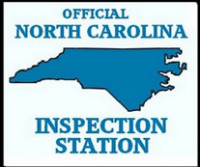
Your NC State Inspection can seem a bit…obtuse. If your car is running fine – especially if it’s brand new – it might seem like a waste of time for it to be inspected. This is especially true because it’s just that: an inspection! Nothing actually changes about your car afterwards.
However, a state inspection is actually a complex process requiring advanced automotive knowledge and training. The process is subject to strict legal regulation, and shops like Fast Lube Plus must be familiar with the regulation to perform inspection.
There’s more to your inspection than just a glance.
Safety vs. Emissions Inspection
North Carolina has two types of vehicle inspections: safety and emissions.
Safety inspections are required everywhere in the state. They focus primarily on the physical aspects of your car: brakes, tires, seatbelts, headlights, and anything else that could make your car dangerous for public operation.
Emissions tests are a bit different. Your car releases a certain amount of harmful greenhouse gases, the limits of which are mandated by the federal government. Because emissions are most concentrated in cities, emissions tests are only required in the state’s 48 most populous counties. Naturally, most of the Triangle falls in that category.
Both inspections have some minimum requirements. For instance, cars made before 1996 don’t have the in-car computers required for emissions testing. Cars older than 35 years also do not require safety inspections. This might sound dangerous, but most cars that old are kept as antiques or showpieces.
Station Qualifications
Becoming authorized to inspect a car is a lot like learning to drive one. It starts with an eight-hour class that can be taken at a community college, followed by a written exam. A local inspector or auditor then administers a live inspection test.
Inspectors must also renew their licenses. Safety inspection licenses must be renewed every four years. Emissions inspections are even more stringent, with an additional class and test and a two-year renewal period.
How We Compare to Other States
State inspection laws vary dramatically, but most share North Carolina’s policy of an annual safety and emissions inspection. However, some states are quite different.
- California: new cars sold in California actually follow an entirely different emissions standard, one much tougher than the federal requirements. They also require emissions inspections for all cars made after 1975. This is due to Callifornia’s extremely dense urban areas.
- Georgia: only cars in and around Atlanta require emissions testing.
- Nevada: only in Las Vegas and Reno, likely because the rest of the state is quite empty.
- Alaska, Arkansas, Florida, Iowa, Kentucky, Michigan, Minnesota, Mississippi, Montana, North and South Dakota, and South Carolina: no inspections of any kind!
Cars have come a long way from the rattly metal boxes of yesteryear. Even the most humble economy box features advanced technology.
So it’s a bit strange that many car owners still use the same old gunky oil that their forefathers did. Many new cars call for synthetic oil, oil that is man-made from both petroleum and other materials. While it might sound like marketing mumbo-jumbo, there’s a reason manufacturers are making the switch. Even for your old car, synthetic oil offers some useful benefits!
Better Engine Protection
Synthetic oil has been used for years in professional racing for its duration at high temperatures. Now you can buy economy cars with race-tested technologies, like the direct injected and turbocharged VW Golf.
These new technologies can generate more heat, heat that can overwhelm old-fashioned fossil oil. Synthetic oil, however, has no problem handling it! This comes in handy in traffic jams during those hot Triangle summers.
On the cold side of things, synthetic oil also gives better lubrication during cold starts. During a cold start, conventional oil is thicker and takes longer to enter the engine. This brief lack of lubrication can add up over time, shortening the life of your vehicle. Most synthetic oils lessen this problem by staying slick at low temperatures.
Longer Service Intervals
If you travel a lot, you’re probably accustomed to frequent oil changes. Most conventional oil needs to be changed every 3,000 to 6,000 miles, depending on operating conditions. It’s an expense and inconvenience that adds up.
Synthetic oils retain their strength longer, so long that on some vehicles (including the VW Golf mentioned above) you don’t have to change your oil for 10,000 miles! While the initial cost of a synthetic oil change is higher, you save money over time by not having to change it as often.
Better Fuel Efficiency
A high friction, heavy oil (like 10W-40 or 20W-50) is harder for your engine to move against. This is good because it provides protection, but bad because it can have an effect on your car’s fuel economy. Synthetic oil often contains additives that reduce this friction, meaning it maintains its slippery qualities while protecting your engine.
Long-term, synthetic oil also runs cleaner. This prevents the gunky deposits that years of conventional oil usage leave inside your engine, gradually reducing its fuel economy. Note that synthetic’s effect on fuel economy also depends on your engine and car, but you may experience a 2-3% increase!
Next time you change your oil at Fast Lube Plus, ask about our synthetic option.
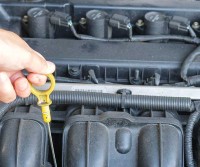
 When money and time are tight, it can be tempting to put off car maintenance. After all, it’s still running, right? Who cares if there’s a little rattle, or a check engine light that won’t go off?
When money and time are tight, it can be tempting to put off car maintenance. After all, it’s still running, right? Who cares if there’s a little rattle, or a check engine light that won’t go off?
Unfortunately, this can be an expensive and dangerous mistake! To give you an idea of just how important maintenance is, we’ve collected some “worst case scenarios” for skipping key maintenance procedures. We’ve also gathered some average maintenance costs from the RepairPal app (available for iOS and Android) for an average priced car (a 2008 Ford Focus.)
What if you never changed your oil?
Oil picks up grime from combustion and any dirt that gets sucked in your engine. Naturally, it gets pretty nasty. If you avoid changing the oil, it stops lubricating your engine and turns this grime into thick deposits. This can cause overheating, worse gas mileage, or complete engine failure. Here’s a photo example from a BMW 3-series. Worst case scenarios include:
- Head gasket failure ($1538+)
- Oil pump failure ($713+)
- Oil pan replacement ($294+)
What if you don’t change your timing belt on time?
A timing belt keeps all those moving bits in your engine from crashing into each other. Some cars have chains, which are maintenance free. If you have a belt, it typically has to be replaced every 60,000 – 100,000 miles. Most cars also have interference engines, which means if this belt snaps, your engine is done. Usually, this means you have to buy a new car.
A timing belt repair usually costs around $600 – $1000, so it’s not cheap. It’s still cheaper than buying a new car, so save up for it!
What if you don’t get an alignment?
As your car drives over bumps and potholes, the suspension gradually gets a little crooked. You’ll notice this if you’re going straight and your steering wheel veers left or right. An alignment fixes this problem, and ensures your tires and suspension wear evenly. Avoiding an alignment can mean:
- New tires ($350+)
- Axle replacement ($485+)
- Wheel bearing replacement ($620+)
What if you ignore those squealing brakes?
The importance of your car’s brakes is obvious. The brake pads are the most frequently replaced brake part. But once these pads wear down, it’s not just a safety issue: the rest of your brake assembly wears down much quicker. If you don’t replace pads on time, you might also pay for:
- New calipers ($305+)
- New rotors ($276+)
As you can see, maintenance is an annoying but necessary expense. When you buy a car, make sure you budget ahead for its maintenance! It’s an investment that protects your valuable purchase.
THIS OFFER HAS EXPIRED AS OF AUGUST, 31, 2015. STAY TUNED FOR MORE OFFERS!
Because it was so popular last time – we’re running the Facebook promo again! Please share with your friends and family. Coupon valid July 13 – August 31, 2015.
**Offer not valid for those who entered the last Facebook Page Promo. Please stay tuned for other discounts and promotions**
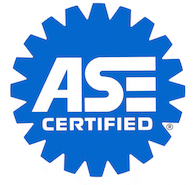 Fast Lube Plus is proud to announce the following team members as ASE Certified. Congrats Team!
Fast Lube Plus is proud to announce the following team members as ASE Certified. Congrats Team!
Cary Fast Lube Plus
- Tommy Pendergrass – ASE Certified Service Writer Technician
- Lloyd Tew – ASE Certified Engine Repair Technician
- Jeremy Harden – ASE Certified Brakes and Suspension Technician
Apex Fast Lube Plus
- Daniel Taylor – ASE Certified Brakes Technician
Holly Springs Fast Lube Plus
- Nate Moore – ASE Certified Brakes and Suspension Technician
- BJ Pesta – ASE Certfied Master Technician
Garner Fast Lube Plus
- Eddie Wilson – ASE Certified Maintenance and Light Repair Technician
Morrisville Fast Lube Plus
- Dan Beavers – ASE Certified Brakes Technician
****
What is ASE?
ASE, is short for the National Institute for Automotive Service Excellence. Since 1972 ASE, an independent non-profit organization, has worked to improve the quality of vehicle repair and service by testing and certifying automotive professionals.
What Does ASE Do?
ASE promotes excellence in automotive repair and service. over 300,000 Automotive Technician and Service Professionals hold ASE Certifications. ASE Certified Technicians work in every part of the automotive service industry. We certify the automotive technician and service professionals not the auto shops.
Why Does ASE Exist?
To protect the automotive service consumer, shop owner, and the automotive technician. We test and certify automotive professionals so that shop owners and service customers can better gauge a technicians level of expertise before contracting the technician’s services. We certify the automotive technician professional so they can offer tangible proof of their technical knowledge. ASE Certification testing means peace of mind for auto service managers, customers.
How Does ASE Certification Work?
In addition to passing an ASE Certification test, automotive technicians must have two years of on the job training or one year of on the job training and a two-year degree in automotive repair to qualify for certification.
The exams are not easy. Only two out of every three test-takers pass on their first attempt. To remain ASE certified professionals must be retest every five years to keep up with ever advancing automotive technology.
Fast Lube Plus is making a lot of changes to benefit our clients in 2015 and just the first of many is a new version of our website at FastLubePlus.com!
The new website was created to not only be easier to navigate and find the most important information to you, but was created to be fully mobile-ready!
We look forward to your feedback on the site and hope you continue to return to find out more about all we have in store for this year.
Let us say thanks for reading by offering you $10 off your next oil change in February. Simply print out the coupon below.
We’ll see you soon!

